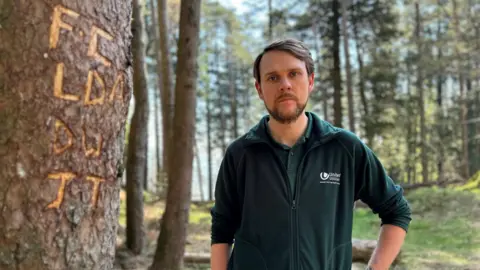Destructive 'fly campers' threatened with fines
 BBC
BBCPeople who litter, light fires or leave equipment while wild camping in a national park could now face fines.
From this month, Cumberland Council has started using Public Space Protection Orders to tackle anti-social behaviour by so-called fly campers in the Lake District.
The National Trust said it spent about £1,000 repairing a single site that was damaged by campers last year.
Neil Dixon, service manager for public places with Cumberland Council, said: "Wild camping has been practised for years, but now it has emerged into fly camping and that is where anti-social behaviour occurs."
Andrew Wright, a woodland officer with United Utilities which owns land around Thirlmere and Haweswater, said he often saw "entire campsites abandoned".
"They'll leave tents, food waste, an awful lot of alcohol, but the worst is the human waste."
 United Utilities
United UtilitiesMr Wright said there had been damage to wildlife with people cutting down trees to make campfires, but there was also a financial cost.
"We are having to pay for skips to be emptied quite regularly, just filled with camping gear," he said.
The National Trust said a group fly camping in Buttermere left behind equipment, mattresses and clothing and had also cut down trees, with the clean-up costing the organisation about £1,000.
Although wild camping is not permitted in the Lake District without the landowners permission, the Lake District National Park Authority said it is normally tolerated if people abide by a number of rules including camping above the highest fell wall and leaving no trace they were there.

Cumberland Council said it is keen to engage with and educate the public around wild camping, but it will now be issuing fixed penalty notices of up to £100 when required.
"Education is key, but as a last resort there is a fixed penalty notice which can be issued to those who choose not to adhere to the Public Space Protection Order," Mr Dixon said.
"We have got several bits of intelligence about where fly camping happens and will be doing hot-spot patrols."
